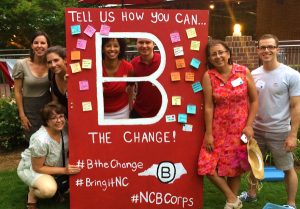
The Wolfpack is part of building momentum for a new social enterprise movement in the Triangle.
Through the Business Sustainability Collaborative (BSC) of NC State’s Poole College of Management, the university has joined a Triangle-area collaborative of entrepreneurs, investors and leaders that aim to double the number of B Corporations operating in North Carolina within two years.
North Carolina is home to more than 40 B Corps, which are businesses that have been certified by the nonprofit B Lab as having met rigorous standards in social and environmental performance, accountability and transparency.
“This is an exciting opportunity to connect our students with a growing movement,” said Jessica Thomas, director of Poole College’s BSC. “We’re interested in the B Corp model because it’s a great way to educate our students about sustainable business models and how business can be good for people, the planet and the bottom line.”
The College is raising visibility of B Corps in curriculum, programs and events. On Oct. 2, Poole College launched the B Corp Clinic, a collaboration between BSC, NC State’s Entrepreneurship Clinic, HQ Raleigh, and NC State student groups Net Impact and Students for Sustainable Solutions. Students from NC State, Duke University and UNC-Chapel Hill are also involved, making the program a collaborative effort of the Triangle’s largest business schools.
Students are assigned to a team that evaluates a company in the HQ Raleigh network. Four HQ companies are participating in the B Corp Clinic fall 2015: Vital Plan, Pendo, Lea(R)n and Vaporware. The students assist the company in obtaining a baseline B Impact Score as well as setting tactical goals to help the company improve its impact over time.
“Our company is minded with making people’s lives better. It’s so important that we live that and make our core values part of our culture,” said Braden Rawls, CEO of Vital Plan. Students will be providing “suggestions on how to do that.”
The clinic builds on the success of a spring 2015 pilot program during which NC State students helped HQ Raleigh identify additional impact opportunities that would earn the company the final points needed to achieve B Corp certification.
“We used the B Corp assessment as a guiding principle [in keeping] HQ Raleigh on track to make an impact,” said Liz Tracy, Director of Community Engagement for HQ Raleigh. “[Continuing the B Corps Clinic] is an opportunity to influence the culture of companies when they’re young and help them build good businesses with intentionality.”
Students participating in the clinic volunteer 4-6 hours each week evaluating their assigned company and will present interim and final presentations with recommendations on how to achieve B Corp certification.
“This is a chance to work with businesses striving to be more sustainable,” said NC State student Bridget Peed, an environmental technology major who participated in the the spring pilot clinic. “I’m passionate about practical applications of sustainability, and B Corp is a great framework for small steps for businesses becoming more sustainable.”
Ultimately, the clinic’s goal is to engage more Triangle-area businesses in the B Corps model while also providing hands-on learning opportunities for students, Thomas said.
“Our hope is that this model can initially be replicated at other academic institutions and eventually much more broadly,” she said.
Another new BSC initiative is the addition of a B Corp Champions Category as part of NC State’s annual startup competition, the Lulu eGames. The category invites students to create new ventures focused on using the power of business to solve social and environmental challenges. Drawing sponsors, mentors and judges from North Carolina B Corporations and Poole’s BSC, the category will award $10,000 in prizes to the winning entries.
“It’s an opportunity for students to compete and understand how to build in impact as they build their businesses,” Thomas said.

With 1,300 B Corps worldwide and a growing number of local B Corps, the collective impact of this movement is ripe for inclusion in business research and teaching. For Rosanna Garcia, a Poole College associate professor of marketing and a Chancellor’s Faculty Excellence Program cluster hire in Innovation+Design, B Corps are real-world examples of how for-profit companies are successfully integrating sustainability.
“It’s important that students understand how environmental and social issues are being taken into consideration [in businesses] because these are major concerns,” she said. “It’s a great foundation that makes them more competitive in the job market.”
Garcia is among the Poole faculty exploring collaborative research opportunities studying B Corps while also integrating the certification into the graduate-level Product and Brand Management course she teaches. Additionally, undergraduate students in the fall 2015 semester Managing Ethics in Organizations course are learning about B Corps.
“The local and global B Corp movement provides an opportunity not just for experiential learning for our students but also for curriculum development and research,” Thomas said.